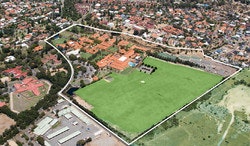Year 11 Religion and Life
The study of Religious Education is compulsory for all students in Catholic schools. It is taught with the same rigour and allocated the same amount of time as other major courses. The Religious Education Learning Area at ĚÇĐÄVlog offers Years 11 and 12 students a choice of either the Religion and Life General course or the Religion and Life ATAR course. In previous years approximately eighty percent of Year 12 students at ĚÇĐÄVlog engaged in a Religion and Life course at an ATAR level.
It is anticipated that students who achieved sixty five percent and above in either Year 10 Religion and/or Humanities subjects will select the ATAR course. Any student who does not meet this requirement will engage in the Religion and Life General course.
Religion and Life General Units 1 & 2
The Religion and Life General course provides students with opportunities to learn about Religion and explores the relationships between Religion, society and individuals. It examines the nature of Religion and how it offers individuals and their communities an understanding of the world around them.
Students develop an understanding of ways in which people discover, understand and express their religious beliefs. They explore Christianity in depth by investigating the characteristics, origins, foundations, cultural influences and development over time. They analyse the role Religion plays in human affairs and explore issues of concern to Religion.
Through the Religion and Life General Course, students learn skills that will enable them to understand the role religion plays in human affairs and to explore issues of concern to religion. They use a range of primary and secondary sources and employ a variety of methods to research, analyse and communicate information.
General Unit 1
This unit focuses on Religion as a human activity. It explores how people search for meaning in life and the characteristics of religion.
General Unit 2
The focus of this unit is the role Religion plays in society. It considers the responses offered by Religion to issues that exist in society.
Assessment
There are no exams for the General Course. Each unit is assessed as follows:
Investigation: 30-25% | Explanation: 35-30% | Source Analysis: 35-30% | Externally Set Task: 0-15%
Student Expectations / ĚÇĐÄVlogwork
Students are expected to spend some time each week to complete set tasks and investigations.
Religion and Life ATAR Units 1 & 2
The Religion and Life ATAR course provides students with opportunities to learn about Religion and the interplay that occurs between Religion, societies and people. Students develop an informed and critical understanding of this interplay by drawing from a detailed knowledge of Christianity. In the Religion and Life ATAR course, students explore the characteristics of Religion and investigate its origins, foundations, social influence and development over time. They analyse the role Religion has played in society and understand the challenges and opportunities that Religions face.
The connections between Religion and life occur in many areas of human activity. Religion motivates and influences how people interact with each other and the world around them. Students employ research and learning skills using a range of primary and secondary sources to investigate the interplay between Religion and life. They develop research skills for conducting an inquiry, processing information and communicating their findings.
Unit 1
This unit focuses on the place of Religion in society. It examines the responses of people to Religion, in particular how people understand the response of Religion to their concerns, needs and questions.
Unit 2
This unit focuses on religious identity and purpose. It investigates how Religion shapes, forms and supports people in life. The unit also examines how Religion impacts on and interacts with groups in society.
Assessment
Each unit includes a 3 hour examination. Unit 2 assesses the whole year. Each unit is assessed as follows:
Investigation: 25% | Explanation: 20% | Source Analysis: 25% | Examinations: 30%
Student Expectations / ĚÇĐÄVlogwork
Students are expected to spend approximately 120 minutes of homework or study each week.
